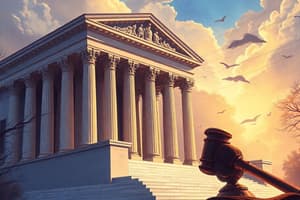Podcast
Questions and Answers
What is judicial review?
What is judicial review?
The power of federal courts to review laws of Congress and acts of the executive branch in light of the Constitution, with the possibility of ruling them unconstitutional.
Does the Constitution mention judicial review directly?
Does the Constitution mention judicial review directly?
No
According to Alexander Hamilton in Federalist No. 78, what is the role of courts?
According to Alexander Hamilton in Federalist No. 78, what is the role of courts?
The courts were designed to be an intermediate body between the people and the legislature.
What does Hamilton say should govern judges' decisions?
What does Hamilton say should govern judges' decisions?
Can federal judges affect public policy?
Can federal judges affect public policy?
What is a remedy in legal terms?
What is a remedy in legal terms?
What is 'senatorial courtesy'?
What is 'senatorial courtesy'?
How do federal judges compare to elected officials?
How do federal judges compare to elected officials?
What checks do the executive and legislative branches have on the judiciary?
What checks do the executive and legislative branches have on the judiciary?
How can judicial review change over time?
How can judicial review change over time?
Flashcards are hidden until you start studying
Study Notes
Judicial Review Overview
- Judicial review allows federal courts to evaluate laws and executive acts against the Constitution, potentially ruling them unconstitutional.
- The Supreme Court uses judicial review to oversee state and local governments' actions.
Constitutional Basis
- Judicial review is not explicitly mentioned in the Constitution, prompting questions about its legitimacy.
Alexander Hamilton's Perspective
- Hamilton described the judiciary as an intermediary protecting the Constitution's limits on legislative power.
- He emphasized that judges should prioritize the Constitution over conflicting statutes.
Impact on Policy
- Federal courts were not intended to create policy; however, significant rulings can alter public policy by reinterpreting laws or the Constitution.
Remedies in Judicial Decisions
- A remedy is a legal enforcement action stemming from a judicial decision, which may require changes in legislative or executive policy.
- For example, the Supreme Court mandated the admission of Allan Bakke to the University of California at Davis Medical School as a remedy for racial discrimination.
Comparison of Judges and Elected Officials
- Federal judges serve the people but are appointed by the president with Senate approval, contrasting with elected officials whose authority comes directly from voters.
- This structure aims to ensure that judicial decisions are based on law and constitutional principles rather than transient public opinion.
Senatorial Courtesy
- "Senatorial courtesy" is the practice where a president seeks recommendations from senators for judicial nominees in their state, affecting appointment chances.
Critiques of Judicial Selection
- Critics argue that senatorial courtesy may blur executive and legislative boundaries in appointing judges.
- There's a call among some Americans for judges to be elected to increase accountability to the public.
Checks on Judicial Power
- The legislative and executive branches can check the judiciary’s power, including the ability to organize federal courts and impeach judges for serious misconduct.
Evolution of Judicial Review
- Changing social values, particularly regarding civil rights, reshape judicial interpretations of laws and the Constitution.
- The ideological beliefs of justices influence their interpretation, as decisions require a majority vote of the nine Supreme Court justices.
Studying That Suits You
Use AI to generate personalized quizzes and flashcards to suit your learning preferences.




